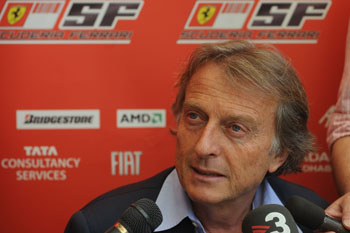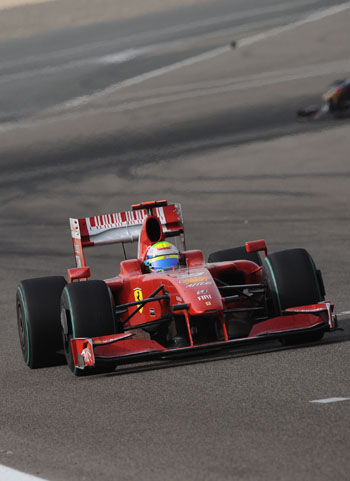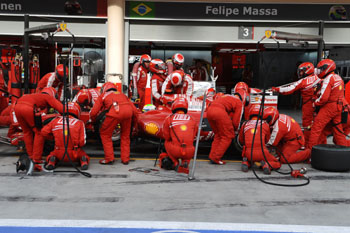

 |
|
Luca di
Montezemolo (top, in Bahrain last weekend)
has registered his disquiet at the FIA's new
cost-cap proposals; Felipe Massa on his way
to a no-points score in Bahrain (middle) and
during a pit stop for tyres and fuel
(bottom); refuelling will be banned next
year. |
|
|
|
A war of
words has broken out between Ferrari and the FIA
President Max Mosley over a proposed £40 million cost
cap with Luca di Montezemolo saying in a letter that the
championship will become "fundamentally unfair and
perhaps even biased".
In a letter to
FIA President Max Mosley, the Ferrari President said that
the budget cap will "inevitably mean that one category will
have an advantage over the other and that the championship
will be fundamentally unfair and perhaps even biased."
Mosley retorted sharply: "I hope Ferrari will take the lead
in agreeing the cost cap mechanism, thus freeing its
engineers to work and preserving its shareholders' money."
Applications to
compete in the 2010 FIA Formula One World Championship are
to be submitted to the FIA during the period 22-29 May 2009.
Teams must state in their application whether they wish to
compete under the cost-cap regulations which mean that from
2010, all teams will have the option to compete with cars
built and operated within a stringent cost cap. The cost cap
for 2010 will be £40m per annum. This figure will cover all
team expenditure except: marketing and hospitality;
remuneration for test or race drivers, including any young
driver programmes; fines or penalties imposed by the FIA;
engine costs (for 2010 only); any expenditure which the team
can demonstrate has no influence on its performance in the
Championship; and dividends (including any tax thereon) paid
from profits relating to participation in the Championship.
A new Costs
Commission is being set up to monitor and enforce these
cost-cap financial regulations. The Costs Commission will
consist of a Chairman and two other Commissioners, appointed
by the WMSC for terms of three years. One Commissioner
should be a finance expert and the other should have high
level experience in motor sport. In addition to the payments
which it already makes to the top ten teams in the
Championship, Formula One Management, the commercial rights
holder, has agreed to offer participation fees and expenses
to the new teams. This includes an annual payment of US$10
million to each team plus free transportation of two chassis
and freight up to 10,000 kg in weight (not including the two
chassis) as well as 20 air tickets (economy class) for each
round trip for events held outside Europe. To be eligible
for this, each new team must qualify as a “Constructor” and
demonstrate that it has the necessary facilities, financial
resources and technical competence to compete effectively in
Formula One.
To enable these cars to compete with those from teams which
are not subject to cost constraints, the cost-capped cars
will be allowed greater technical freedom. The principal
technical freedoms allowed are: movable wings, front and
rear; and an engine which is not subject to a rev limit. The
teams will also be allowed unlimited out-of-season track
testing with no restrictions on the scale and speed of wind
tunnel testing.
It was also confirmed that from 2010, refuelling during a
race will be forbidden in order to save the costs of
transporting refuelling equipment and increase the incentive
for engine builders to improve fuel economy (to save
weight). It was also confirmed that tyre blankets will be
banned and that the ban on other tyre-heating devices will
be maintained.
Meanwhile
Ferrari, which has made it clear in the last two days that
it is opposed to the new regulations in their present form, issued a statement
that read: "On the subject of the
future of Formula 1, Ferrari reaffirms
its strong commitment and sense of
responsibility to maintaining untouched
the values of this sport. As the only team to have
taken part in every F1 world
championship since its inception in 1950
up to the present day, Ferrari strongly
believes that this sport should maintain
its principles of being at the cutting
edge in terms of research, with the
teams thus taking part in a sporting and
technical contest.
"Ferrari, along with all
the other teams in FOTA," the statement
issued in Maranello continued, "has, for some
time now, felt the urgent need for a
significant reduction in costs as from
this year, and believes that the future
of this sport requires stability of the
regulations and the gradual achievement
over the next two to three years of a
cost-profit balance which would allow
current teams to remain in the sport
while at the same time encouraging the
arrival of new ones. This is the position
Ferrari wants to underline today, in the
interests of the sport without looking
to cause pointless controversy which
would be harmful to all those involved
in this sport."
|